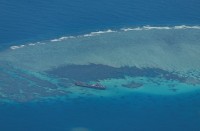
NICOSIA, Cyprus (AFP) — Cyprus on Monday reported its first two confirmed cases of the novel coronavirus, meaning that all 27 European Union member states have now reported infections.
Health Minister Constantinos Ioannou said the two cases were both Cypriot men who had recently travelled home from overseas, and had been among dozens of people tested.
“Two of… 50 samples were positive, so these are the first cases of the coronavirus in Cyprus… there is no need to panic,” Ioannou told a press conference early on Monday evening.
One of the men was aged 25 and had recently returned from a trip to Milan, Italy, while the other was a 64-year-old health professional working at a state hospital in Nicosia who had returned from a trip to the UK.
Ioannou urged anyone who has travelled to a country with a coronavirus outbreak and has symptoms of the disease to self-isolate.
The 25-year-old, from Limassol, was tested at Larnaca airport on returning from Milan on February 26 and was in self-isolation when he tested positive.
But the 64-year-old – who returned from the UK on March 3 – had started showing symptoms of the deadly virus for several days before reporting his case to the health authorities.
“What’s regrettable is that he didn’t report his symptoms until five days later,” said Ioannou. “This creates a problem in trying to trace who he came into contact with.”
According to the World Health Organisation (WHO) website on Monday afternoon, all 26 other European Union member states had already reported cases of the new coronavirus on their soil.
The Mediterranean island is divided between areas under the de facto control of EU member state the Republic of Cyprus and the northern third controlled by the breakaway Turkish Republic of Northern Cyprus, recognised only by Ankara.
Cypriot authorities on 29 February closed four of the eight checkpoints on the line dividing the island “for more effective control over the entry points”, sparking angry protests.
Police last Saturday sprayed tear gas as several hundred people protested against the closure of four crossings on the ceasefire line over coronavirus fears.
© Agence France-Presse







